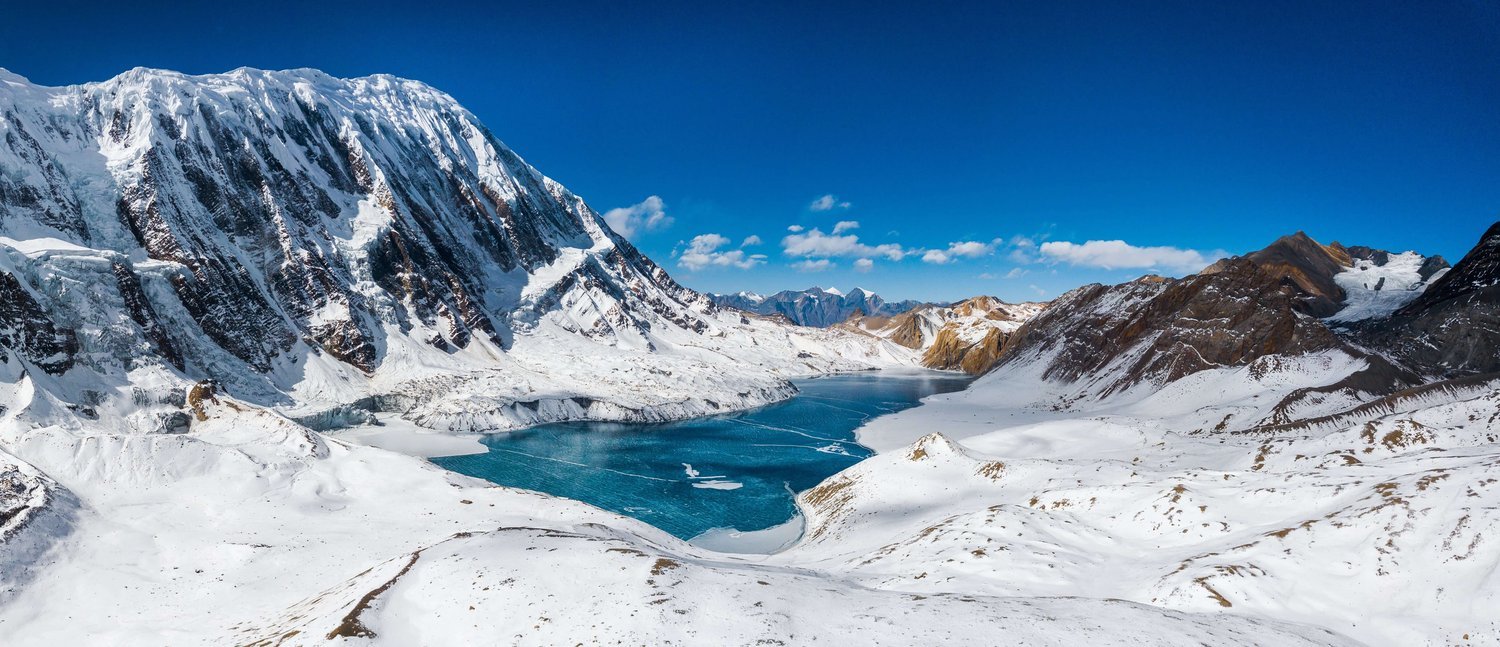Khumbu 3 Peak or Annapurna 3 Peak: Which 6000M Three Peak Challenge to Climb? – Namas Adventure


Khumbu 3 Peak vs Annapurna 3 Peak: Which One Should You Choose?
When it comes to choosing between the Khumbu 3 Peak Expedition and the Annapurna 3 Peak Expedition, it really comes down to what type of adventure you’re craving. Both expeditions offer unique experiences in Nepal’s legendary mountains, but each has its own charm. So, which one will give you the experience you’re looking for? Let’s break it down and help you figure out which one suits you best.
Khumbu 3 Peak Expedition
If you’ve ever dreamed of standing beneath the shadow of Mount Everest, the Khumbu 3 Peak Expedition might just be your dream come true. This trek will take you through the heart of the Everest region, with climbs up Mera Peak, Island Peak, and Lobuche East, offering some of the most iconic views on the planet.
Breathtaking Views of Everest: There’s something magical about looking up and seeing Everest in all its glory. On the Khumbu 3 Peak Expedition, that’s your backdrop. Along the way, you’ll pass stunning vistas of Mount Everest, Lhotse, Makalu, and several other towering peaks. The scenery here is second to none.
Climbing Variety: The climbs themselves will challenge you in different ways. Mera Peak is more straightforward, but Island Peak and Lobuche East will push your skills. Island Peak is particularly technical, with a steel ladder over crevasses and a steep ascent to the summit. It's an exhilarating climb, one that makes you feel like you're truly on an adventure.
Immersive Sherpa Culture: The Khumbu region is rich in Sherpa culture, and throughout your journey, you’ll have the opportunity to learn about the people who call this rugged terrain home. The culture here is as awe-inspiring as the mountains themselves, and this expedition gives you a chance to connect with it on a personal level.
The Khumbu 3 Peak Expedition is perfect for anyone who dreams of Everest and is looking to challenge themselves both physically and mentally, while experiencing the deep-rooted Sherpa culture.
Annapurna 3 Peak Expedition:
If you’re drawn to quieter trails, breathtaking mountain scenery, and a bit less foot traffic, the Annapurna 3 Peak Expedition might be more your style. Set in the stunning Annapurna region, this trek takes you through serene villages and alpine landscapes as you climb Chulu West, Chulu Far East, and Pisang Peak.
Less Crowded, Just as Beautiful: The Annapurna region is just as stunning as the Everest region, but without the same level of traffic. If you’re looking for a more peaceful, less commercialized trekking experience, the Annapurna 3 Peak Expedition offers that. You’ll have more space to breathe and a chance to enjoy the beauty of the Himalayas without the crowds.
Cultural Immersion: As you trek through villages like Manang and explore the Annapurna massif, you’ll get a much deeper sense of local life. The Annapurna region is home to rich traditions, and this trek offers you a chance to connect with the communities in a more relaxed setting.
Challenging, but Rewarding Climbs: The climbs here are a perfect mix of technical and moderate. Chulu West is the most technical of the three, with some tricky climbing near the summit, while Pisang Peak is more moderate but still a solid challenge. The Annapurna peaks offer a different kind of challenge, one that combines a sense of adventure with a touch of serenity.
If you're someone who prefers a more peaceful, cultural experience while still facing a great physical and mental challenge, the Annapurna 3 Peak Expedition will feel like home.
So, Which One Should You Choose?
Ultimately, the decision between the Khumbu 3 Peak Expedition and the Annapurna 3 Peak Expedition depends on what kind of experience you're hoping to get out of it.
Choose the Khumbu 3 Peak Expedition if you want the full Everest experience — think iconic views, a variety of climbing challenges, and the chance to immerse yourself in the unique Sherpa culture. If you’ve always dreamed of seeing Everest up close and want to push yourself with some technical climbs, this is the expedition for you.
Choose the Annapurna 3 Peak Expedition if you want a quieter, more peaceful trek in a beautiful, less-crowded region. The Annapurna massif is every bit as stunning as Everest, and with its beautiful villages and serene landscapes, you’ll experience the Himalayas in a more intimate setting. Plus, the climbing is no less challenging — you’ll still be tested, but with a slightly different vibe.
Both expeditions are designed for climbers who are physically prepared and ready to take on 6000-meter peaks, and both will challenge you in different ways. Both are full of rewards — stunning landscapes, unforgettable summits, and the sheer joy of being in the heart of the Himalayas.
The Bottom Line: Both Are Life-Changing Experiences
Whichever you choose, both the Khumbu 3 Peak Expedition and the Annapurna 3 Peak Expedition will offer you the chance to test your limits, experience some of the most incredible landscapes on Earth, and leave you with memories that last a lifetime. They’re both excellent introductions to Himalayan climbing and will help you develop skills and confidence for bigger climbs in the future. At the end of the day, it’s all about what kind of experience you’re looking for. Whether it’s the towering peaks and cultural richness of Khumbu or the quieter, intimate beauty of Annapurna, you’ll find adventure, challenge, and inspiration in either one.
If you’re ready for the challenge, we would love to have you join us on this unforgettable adventure. For more information, feel free to contact us at bookings@namasadventure.com.
Climb higher. Embrace the challenge. And become the adventurer you were always meant to be.
Live Your Story!
Khumbu Three Peak Expedition vs. Annapurna Three Peak Expedition: A Comprehensive Comparison
Khumbu Three Peak vs. Annapurna Three Peak Expedition: A Comprehensive Comparison
Introduction
If you're exploring your next mountaineering adventure and want to challenge yourself with a once-in-a-lifetime adventure climbing 6,000 meters in the Himalayas, we present two exciting triple summit expeditions: the Annapurna Three Peak Expedition and the Khumbu Three Peak Expedition challenge. These expeditions stand out for their unique challenges and breathtaking landscapes, serving as a pure test of endurance and offering thrilling summit adventures amidst stunning beauty. Both involve summiting three significant peaks, providing an unparalleled experience for climbers. This article delves into a detailed comparison to help you choose the expedition that best aligns with your aspirations and capabilities.
Overview of the Expeditions
Khumbu Three Peak Expedition
Location: Khumbu (Everest), and Mera region. Eastern Nepal
Peaks Summited:
Mera Peak: 6,476 meter (21,246 feet)
Island Peak (Imja Tse): 6,189 meters (20,305 feet)
Lobuche East Peak: 6,119 meters (20,075 feet)
Duration: 30 days
Highlights: Iconic views of Everest, vibrant Sherpa culture, famous trekking routes
Annapurna Three Peak Expedition
Location: Annapurna Region, Central Nepal
Peaks Summited:
Chulu West: 6,419M meters (20,173 feet)
Chulu East: 6584 meters (21,601 feet)
Chulu Far East: 6,059 meters (19,878 feet)
Duration: 26 days
Highlights: Less crowded trails, diverse ecosystems, panoramic views of the Annapurna massif
Scenery and Terrain
Annapurna Region
Diverse Landscapes: From subtropical forests to alpine meadows and high-altitude deserts
Less Crowded Trails: Offers a more solitary and serene experience, unique cultural expereinces
Unique Features: Annapurna Sanctuary and massif 8000M - 7000M peaks, deep gorges, and terraced farmlands
Khumbu Region
Eveest, Lhotse Sharr seen from Everest trail.
Iconic Landscapes: Home to Everest, the world's highest peak
Busier Trails: Popular among trekkers worldwide, especially during peak seasons
Unique Features: Sagarmatha National Park, Khumbu Glacier, and the famous Everest Base Camp trail, to world highest peaks. Everest, Lhotse, Cho-Oyu etc
If you prefer solitude and diverse ecosystems, Annapurna might appeal more. For iconic mountain vistas and bustling trails, Khumbu is ideal.
Cultural Experiences
Annapurna Region
Ethnic Communities: Gurung and Magar villages
Cultural Highlights: Traditional farming practices, local festivals, and handicrafts
Monasteries and Temples: Bragha Iconic Monastery, Muktinath Temple (Mustang)
Braga Monaster, Manag region.
Khumbu Region
Ethnic Communities: Sherpa heartland
Cultural Highlights: Visit Tengboche Monastery, experience Sherpa hospitality
Monasteries and Temples: Tengboche Monastery
Tenboche Monastery, Everest region.
The Khumbu region offers a deep dive into Sherpa culture, while Annapurna provides a blend of different ethnic experiences.
Difficulty and Technical Requirements
Annapurna Three Peak Expedition
Technical Climbing: Chulu East and West Peak requires moderate technical skills, including ice and rock climbing. Chulu Far East peak requires is a lesser technical approach to mostly being high altitude trekking peak.
Physical Demands: High level of fitness required due to challenging terrains and higher altitudes
Preparation Needed: Prior high-altitude trekking and some climbing experience are essential
Khumbu Three Peak Expedition
Technical Climbing: Island Peak and Lobuche East require moderate technical skills; Mera Peak is less technical
Physical Demands: Demanding and must be fit for several days of climb and trek
Preparation Needed: Good physical condition and some basic climbing experience recommended
Annapurna's expedition is generally considered more challenging due to technical requirements, making it suitable for experienced climbers.
Best Time to Trek
Annapurna Region
Spring (March to May): Blooming rhododendrons, moderate temperatures
Autumn (September to November): Clear skies, ideal for mountain views
Winter: Less favorable due to harsh weather and trail conditions
Khumbu Region
Spring (March to May): Busy season, pleasant weather
Autumn (September to November): Most popular, excellent visibility
Winter: Possible but very cold; suitable for those who can endure low temperatures
Monsoon: Not recommended due to heavy rains and cloud cover
Both regions share similar optimal trekking seasons, with spring and autumn being the most favorable.
Logistics and Accessibility
Annapurna Three Peak Expedition
Starting Point: Kathmandu to Besisahar via jeep and off road to Humde
Transportation: Road transport to trailheads; fewer flights involved
Accommodation: Combination of teahouses and camping
Permits Required:
Annapurna Conservation Area Permit (ACAP)
Trekkers' Information Management System (TIMS) card
Climbing permits for each peak
Khumbu Three Peak Expedition
Starting Point: Lukla, reached by a flight from Ramechap
Transportation: Flight to Lukla; trekking from there
Accommodation: Well-established teahouses along the trail
Permits Required:
Sagarmatha National Park Entry Permit
Climbing permits for each peak
Khumbu is more famous for most traveller. Weather can cause delays to Lukla flights. Annapurna offers more flexibility with transportation.
Cost Considerations
All inclusive cost with Namas Adventure team
Safety Measures
Annapurna Region
Altitude Risks: Higher peaks may increase the risk of altitude sickness
Trail Conditions: Less crowded trails mean fewer immediate assistance options
Rescue Operations: Available but may take longer than Khumbu region
Khumbu Region
Altitude Risks: Still significant but with more established acclimatization protocols
Trail Conditions: Busy trails mean help is often nearby
Rescue Operations: More efficient due to better infrastructure and frequent helicopter services
Both expeditions require comprehensive safety measures, but Khumbu benefits from better-established rescue operations.
Who Should Choose Which Expedition?
Choose Annapurna If:
You prefer less crowded trails and a more solitary experience
You're looking for a challenging expedition with higher technical demands and mix of alpine and fixed line climbing
You're interested in diverse landscapes and ecosystems
Annapurna massif. Annapurna region.
Choose Khumbu If:
You want to experience iconic views of Everest and surrounding peaks
You're interested in Sherpa culture and well-established trekking routes
You prefer slightly less technical climbs
You require better infrastructure and amenities
Gokyo Ri. Everest region.
Your choice should align with your personal preferences, experience level, and what you seek to gain from the expedition.
Conclusion
Both the Annapurna Three Peak Expedition and the Khumbu Three Peak Expedition offer unparalleled opportunities to explore the majestic Himalayas. Your decision should be based on your experience, desired level of challenge, cultural interests, and logistical preferences. Whichever expedition you choose, you're guaranteed an adventure that will test your limits and leave you with memories to last a lifetime.
Ready to embark on your Himalayan journey?
Contact Namas Adventure to book your expedition today!















